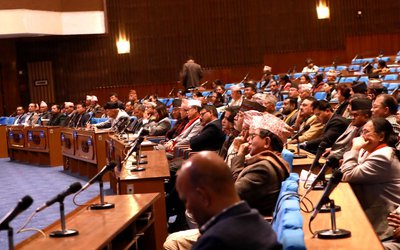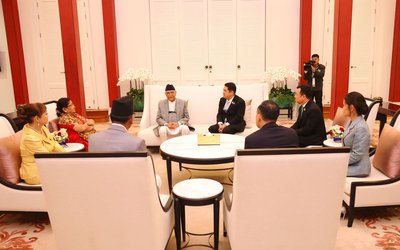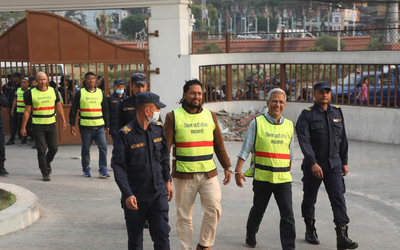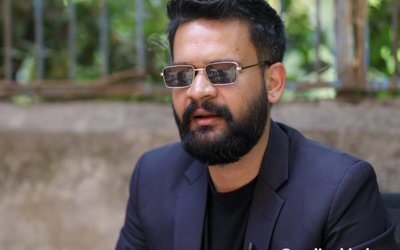More on News




Rakesh Sood, India’s ambassador to Nepal, is Nepal’s new king. At least that’s what many journalists in Nepal think.
“He can meet the prime minister anytime he wants and call the ministers and give directions,” one journalist with the English-language Kathmandu Post daily says. “That’s far beyond what any normal diplomatic protocols allow.”
“And when you report that or write editorials about him or on India’s influence and activities in Nepal, you are expected to do so with fear and reverence,” added the journalist. “Do not publish those things or if you have to, keep it very briefly somewhere in the inside pages.”
Concern about Indian power in Nepal isn’t a new phenomenon — the small nation sits uneasily on the border between India and China — but Nepali journalists saw fresh cause for worry in recent weeks after customs authorities in the Indian port city of Kolkata seized several consignments of newsprint bound for the landlocked Himalayan nation’s largest media publisher, Kantipur Publications.
After talks with the Indian embassy failed to make headway, its papers, the Kantipur Daily (Kantipur is the medieval name of Nepal’s capital, Kathmandu), the largest selling Nepali-language paper, and the Kathmandu Post, published stories earlier this week saying Indian authorities had not explained enough to them why they seized consignments that total 1,000 metric tons of newsprint starting May 27.
Kolkata customs official V.K. Airwer said the Directorate of Revenue Intelligence, a federal department that investigates smuggling, was now in control of the newsprint with “the agreement that the consignments should be released soon.” The directorate did not immediately respond to requests for comment.
Kantipur Publications now only has enough newsprint to keep its papers and magazines going for another week, Hari Gauchan, the finance manager for the media house, said. On Friday the Kantipur Daily didn’t publish its usual weekend supplement citing the lack of newsprint.
Kantipur Daily senior news editor Hari Bahadur Thapa believes Kantipur Publications may be facing retaliation for its reporting on the months-long controversy over a Nepali contract to produce machine-readable passports required by a new international aviation rule. On April 12, its newspapers quoted from a confidential letter that the reports said Mr. Sood sent to Nepal’s Foreign Minister Sujata Koirala in December after the government began seeking bids for a publisher for the passports. The letter reportedly said India could print the passports for Nepal, addressing national security concerns on India’s part and saving the Nepali government money.
“In recent times, open border has also been the source of certain security concerns which have been shared with the Nepali leaders at the highest level,” the report quoted Mr. Sood’s letter as saying. “This offer will not only address some of the security concerns that have been mentioned but I am also certain will prove to be economical for the Government of Nepal.”
Soon after the letter was sent, Nepal’s foreign ministry cancelled the bidding for the passport contract and awarded it to an Indian government-controlled printing company, Kantipur’s newspapers reported. In the face of parliamentary opposition after media reports on the letter, that contract was scrapped in April and fresh bidding is underway by multinational firms. Nepal’s foreign ministry and the Indian embassy could not immediately be reached for comment on the passport contract.
The Indian embassy in Kathmandu, meanwhile, has described the customs move as “a routine administrative measure.”
“The distorted manner in which the issue has been publicized is hardly helpful in bringing about an early resolution of the customs investigation,” the embassy said in a statement Wednesday.
Now Mr. Sood appears to have inherited the unpopularity formerly enjoyed by Nepali’s deposed king.
As Nepal’s journalists saw it, reverence was what Nepal’s monarchs expected from their subjects. But royal rule came to an end in 2008 when political parties abolished the 240-year-old monarchy and essentially fired the last Shah dynasty ruler, King Gyanendra, who had briefly seized more power by dissolving parliament in 2005.
In a conversation with India Real Time on the newsprint issue, Mr. Sood said India did not interfere with the workings of the press anywhere.
“I have the privilege to represent the country that is the largest democracy in the world,” Mr. Sood said. “We respect free media in our country and everywhere else.”
(The Wall Street Journal)



